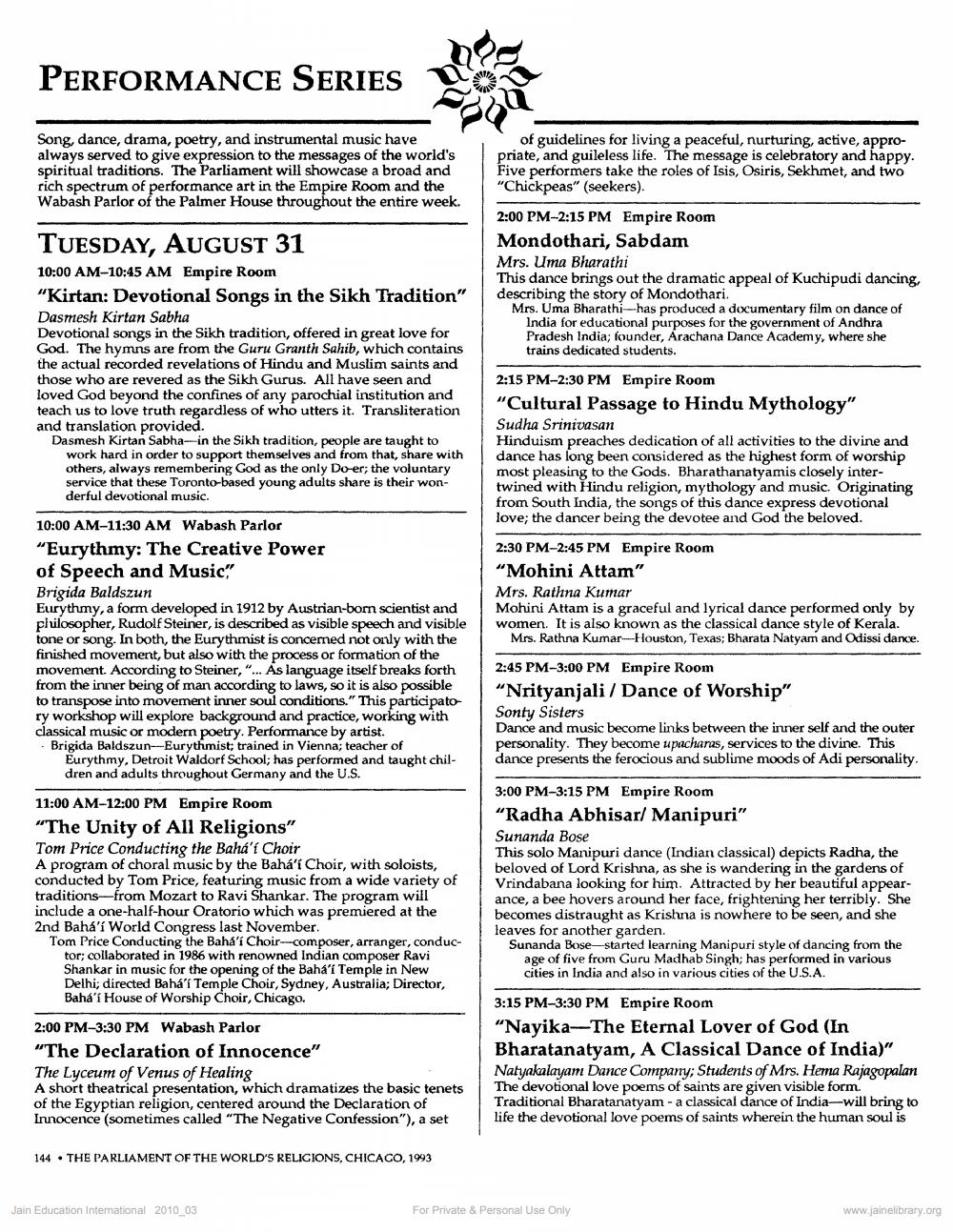________________
PERFORMANCE SERIES
_
_
Song, dance, drama, poetry, and instrumental music have always served to give expression to the messages of the world's spiritual traditions. The Parliament will showcase a broad and rich spectrum of performance art in the Empire Room and the Wabash Parlor of the Palmer House throughout the entire week.
of guidelines for living a peaceful, nurturing, active, appropriate, and guileless life. The message is celebratory and happy. Five performers take the roles of Isis, Osiris, Sekhmet, and two "Chickpeas" (seekers).
2:00 PM-2:15 PM Empire Room Mondothari, Sabdam Mrs. Uma Bharathi This dance brings out the dramatic appeal of Kuchipudi dancing, describing the story of Mondothari. Mrs. Uma Bharathi-has produced a doxumentary film on dance of
India for educational purposes for the government of Andhra Pradesh India; founder, Arachana Dance Academy, where she trains dedicated students.
TUESDAY, AUGUST 31 10:00 AM–10:45 AM Empire Room "Kirtan: Devotional Songs in the Sikh Tradition" Dasmesh Kirtan Sabha Devotional songs in the Sikh tradition, offered in great love for God. The hymns are from the Guru Granth Sahib, which contains the actual recorded revelations of Hindu and Muslim saints and those who are revered as the Sikh Gurus. All have seen and loved God beyond the confines of any parochial institution and teach us to love truth regardless of who utters it. Transliteration and translation provided. Dasmesh Kirtan Sabha in the Sikh tradition, people are taught to
work hard in order to support themselves and from that, share with others, always remembering God as the only Do-er; the voluntary service that these Toronto-based young adults share is their wonderful devotional music.
2:15 PM–2:30 PM Empire Room "Cultural Passage to Hindu Mythology" Sudha Srinivasan Hinduism preaches dedication of all activities to the divine and dance has long been considered as the highest form of worship most pleasing to the Gods. Bharathanatyamis closely intertwined with Hindu religion, mythology and music. Originating from South India, the songs of this dance express devotional love; the dancer being the devotee and God the beloved.
10:00 AM–11:30 AM Wabash Parlor "Eurythmy: The Creative Power of Speech and Music Brigida Baldszun Eurythmy, a form developed in 1912 by Austrian-born scientist and philosopher, Rudolf Steiner, is described as visible speech and visible tone or song. In both, the Eurythmist is concerned not only with the finished movement, but also with the process or formation of the movement. According to Steiner, "... As language itself breaks forth from the inner being of man according to laws, so it is also possible to transpose into movement inner soul conditions." This participato ry workshop will explore background and practice, working with classical music or modern poetry. Performance by artist. - Brigida Baldszun-Eurythmist; trained in Vienna; teacher of
Eurythmy, Detroit Waldorf School; has performed and taught children and adults throughout Germany and the U.S.
2:30 PM–2:45 PM Empire Room "Mohini Attam" Mrs. Rathna Kumar Mohini Attam is a graceful and lyrical dance performed only by women. It is also known as the classical dance style of Kerala.
Mrs. Rathna Kumar--Houston, Texas; Bharata Natyam and Odissi dance. 2:45 PM–3:00 PM Empire Room "Nrityanjali/ Dance of Worship" Sonty Sisters Dance and music become links between the inner self and the outer personality. They become upachanas, services to the divine. This dance presents the ferocious and sublime moods of Adi personality.
11:00 AM-12:00 PM Empire Room "The Unity of All Religions" Tom Price Conducting the Bahá'í Choir A program of choral music by the Bahá'í Choir, with soloists, conducted by Tom Price, featuring music from a wide variety of traditions from Mozart to Ravi Shankar. The program will include a one-half-hour Oratorio which was premiered at the 2nd Bahá'í World Congress last November. Tom Price Conducting the Bahá'í Choir--composer, arranger, conduc
tor; collaborated in 1986 with renowned Indian composer Ravi Shankar in music for the opening of the Bahá'í Temple in New Delhi; directed Bahá'í Temple Choir, Sydney, Australia; Director, Bahá'í House of Worship Choir, Chicago.
3:00 PM–3:15 PM Empire Room "Radha Abhisar/ Manipuri" Sunanda Bose This solo Manipuri dance (Indian classical) depicts Radha, the beloved of Lord Krishna, as she is wandering in the gardens of Vrindabana looking for him. Attracted by her beautiful appearance, a bee hovers around her face, frightening her terribly. She becomes distraught as Krishna is nowhere to be seen, and she leaves for another garden. Sunanda Bose-started learning Manipuri style of dancing from the
age of five from Guru Madhab Singh; has performed in various cities in India and also in various cities of the U.S.A.
2:00 PM–3:30 PM Wabash Parlor "The Declaration of Innocence" The Lyceum of Venus of Healing A short theatrical presentation, which dramatizes the basic tenets of the Egyptian religion, centered around the Declaration of Innocence (sometimes called "The Negative Confession"), a set
3:15 PM–3:30 PM Empire Room "Nayika--The Eternal Lover of God (In Bharatanatyam, A Classical Dance of India)" Natyakalayam Dance Company; Students of Mrs. Hema Rajagopalan The devotional love poems of saints are given visible form. Traditional Bharatanatyam - a classical dance of India-will bring to life the devotional love poems of saints wherein the human soul is
144 . THE PARLIAMENT OF THE WORLD'S RELIGIONS, CHICAGO, 1993
Jain Education Interational 2010_03
For Private & Personal Use Only
www.jainelibrary.org




